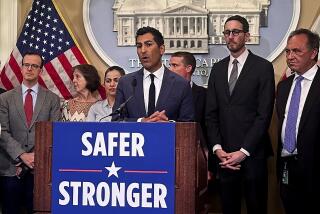Senate Panel Votes to Limit Racketeering Law : Legal Affairs: The bill would limit damages in RICO cases involving securities. Passage might affect investors who lost money in failed savings and loans.
- Share via
WASHINGTON — In a move that might affect investors who try to recoup money from failed savings and loans, the Senate Judiciary Committee Thursday voted to greatly restrict the damages that can be awarded under the nation’s primary anti-racketeering law.
Sen. Joseph R. Biden Jr. (D-Del.) said the bill would not affect pending cases, such as those filed by investors who lost thousands of dollars by purchasing bonds through the failed Lincoln Savings & Loan of Irvine.
However, the bill would severely limit damage awards in future cases brought under the Racketeering Influenced and Corrupt Organizations Act (RICO).
RICO, passed in 1970, currently allows victims of a pattern of fraud to sue for triple damages and provides substantially more lenient standards for prosecutors to prove their cases. It was originally designed as a powerful tool to fight organized crime and cut its profitability. But the advantages it offers have encouraged its use as a legal tool against a variety of white-collar crimes, including fraudulent S&L; practices.
Under provisions of the bill sponsored by Sen. Dennis DeConcini (D-Ariz.), plaintiffs in civil cases could seek punitive damages up to twice actual damages plus attorney fees. However, in cases involving securities or commodity futures, they would be limited to actual damages, without attorney fees. Moreover, attempting to collect on punitive awards would mean facing a second court action following a trial.
Victims also would have to show “clear and convincing evidence” of fraud rather than the “preponderance of evidence” often used in civil cases. They would also have to prove that “the defendant’s actions were consciously malicious or so egregious and deliberate that malice may be implied.”
Supporters of the bill complain that the courts have faced a landslide of RICO suits having nothing to do with organized crime.
“There are abuses in the RICO area that just plain shouldn’t exist,” Sen. Orrin Hatch (R-Utah) said before the committee. “This bill has been used to extort, it has been used to oppress, it has been used to kill businesses.”
According to figures from the Justice Department, in 1987 and 1988 about 1,000 civil racketeering suits were filed by private plaintiffs seeking triple damages in business, investment and employer-union disputes.
“Congress simply did not intend to create a federal forum for every argument between businessmen,” said DeConcini.
Rep. Frederick Boucher (D-Va.) said RICO reform is also popular in the House, and he expects an almost exact copy of the Senate bill to be approved by the House Judiciary Committee this month.
The 11-2 vote--Sens. Edward Kennedy (D-Mass.) and Howard Metzenbaum (D-Ohio) voted against the measure--places the legislation before the full Senate, although it will likely be a number of weeks before a vote is taken. Metzenbaum argued that the bill would leave the private citizen unprotected and vowed to fight it.
William Lerach, whose San Diego law firm is representing investors who have taken legal action against Lincoln Savings and its parent company, American Continental Corp., said he and his clients were ignored by the committee.
“Our clients have been trying for seven months to testify and for seven months Sen. DeConcini has refused to afford us that right. They claim there was not enough time. Don’t you think that in seven months the Senate could find one hour to listen to two or three of the over 23,000 people affected by this issue?”
“The bill is basically a bailout for white-collar offenders,” said attorney G. Robert Blakey, who helped formulate RICO.
“History will not be kind to those who voted for this bill. The antitrust laws guarantee freedom in the marketplace; RICO guarantees integrity,” he added.
DeConcini defended himself before the committee concerning his involvement in the failed Lincoln S&L.; Investors in Lincoln lost more than $200 million.
“I have been subject to attacks that I am doing this in response to a savings and loan in Arizona. That is not true,” he said. “RICO does not apply to Lincoln Savings and Loan.”
More to Read
Get the L.A. Times Politics newsletter
Deeply reported insights into legislation, politics and policy from Sacramento, Washington and beyond. In your inbox twice per week.
You may occasionally receive promotional content from the Los Angeles Times.










